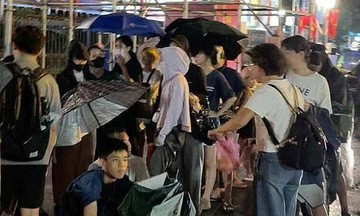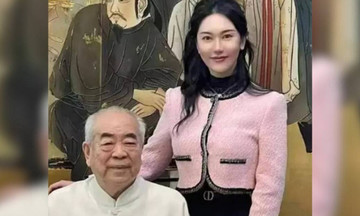Eros Media Group is re-releasing the 2013 romantic drama "Raanjhanaa" (Beloved One) with a new, happier ending generated by AI, the Guardian reported on 27/7. The original film, starring Dhanush as Kundan and Sonam Kapoor as Zoya, depicts a tragic love story between two young people from different religious backgrounds, culminating in Kundan's death. The film, produced for 360 million rupees (approximately 109 billion VND) and grossing over 1.05 billion rupees (over 317 billion VND), was a box office success both domestically and internationally. The re-release is scheduled for August 1st in theaters across Tamil Nadu, a state in southern India.
 |
"Raanjhanaa" poster from 2013. Photo: Indian Express
Predeep Dwivedi, CEO of Eros Media Group, told the Independent that the AI-generated ending was created under human supervision and is presented as a supplemental addition to the original, not a replacement. This project is part of the company's long-term technology innovation strategy and serves as an initial experiment for potential application to their library of over 3,000 films. "Creating a happy ending offers new perspectives for audiences across different languages and cultures. If technology can help create better outcomes, we should utilize it," he stated.
However, the decision has faced significant backlash. Director Aanand L. Rai told NDTV he only learned about the change through social media. He described the alteration as a "betrayal of the film’s fans over the past 12 years," arguing that "Raanjhanaa" didn't need a new ending and resonated with audiences because of its poignant portrayal of the characters' circumstances.
Rai also raised ethical and legal concerns, particularly regarding artistic consent. "They’ve interfered with the actors' performances without their agreement. How can you modify performances a decade after the film's release?" he questioned. He stated that he and his team have filed a complaint with the Indian Film & Television Directors’ Association (IFTDA) and are considering legal action.
In response, Dwivedi maintained that Eros Media had addressed Rai's concerns "politely and transparently," though they weren't obligated to discuss the changes. He pointed out that Rai, Dhanush, and Kapoor had signed contracts relinquishing rights related to future releases of the film. Under Indian law, Eros Media holds the complete copyright. Dwivedi suggested Rai's criticism was personal due to an ongoing legal dispute between the company and the director over alleged financial and managerial misconduct. He also positioned AI as part of a larger industry trend, enhancing art and fostering creativity.
The altered ending has also sparked concerns about the film's religious themes, a sensitive topic in India. Film critic Sucharita Tyagi argued the original ending reflected the harsh realities of the time, where social customs hindered love, while the new ending could romanticize the situation, misrepresenting the message and diminishing the film's social commentary.
Trailer "Raanjhanaa" released in 2013. Video: Eros Now Music
This re-release comes amid the increasing integration of AI in filmmaking. 20th Century Fox used AI to analyze the script of "Logan," informing plot and thematic decisions. Studios like Warner Bros. employ software like Cinelytic for actor evaluation, revenue prediction, and location scouting. Disney's FaceDirector was used in "Avengers: Infinity War" to refine CGI facial expressions. On 18/7, the Guardian reported Netflix's first use of generative AI to create visual effects for a building collapse scene in the sci-fi series "El Eternauta."
While some experts view AI as an inevitable new tool in filmmaking, its use remains controversial and contributed to the 2023 Hollywood strikes. The Screen Actors Guild‐American Federation of Television and Radio Artists (SAG-AFTRA) is demanding stricter regulations on AI. According to Forbes, many industry professionals criticize AI as "devaluing artistic work." Actor and producer Tyler Perry halted plans for an $800 million studio expansion in Atlanta due to concerns about AI-generated videos impacting jobs.
Chau Anh (via Guardian, Independent)











